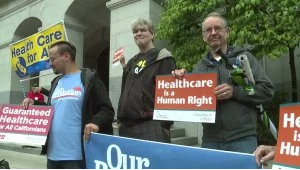
The Golden State: All That Glimmers?
Critics of the Trump Administration did not envision it to foster improved health coverage anywhere in the country (quite the opposite), however on the ground at least two states are en route to potentially do just that. California has once again brought to the floor a proposal to create a single-payer health insurance system for the state. Inspired by the “Medicare-for-All” movement championed by Senator Bernie Sanders, the latest rendition of California’s attempts to create a publicly financed health care system is now before the State Assembly for a vote. The last time a bill like this was in California’s legislature it passed only to be vetoed by then Governor Schwarzenegger. Governor Brown has not come out against the measure but has voiced his concern over its gargantuan cost: $400 billion, of which half would need to come from new revenue sources (i.e. taxes). Vermont famously tried something similar only to see its plan collapse under the burdens of needing an extra $2.5 billion for it.
Single-payer systems elsewhere are generally less expensive for both individuals and nations than what the US pay. There are trade-offs to single payer systems in terms of patient experiences, but in the United States there is also a legal question around constitutionality and federalism. The Affordable Care Act’s Medicaid Expansion was curtailed in NFIB v. Sebelius in part because the Supreme Court felt that it was too coercive to the States to have adopt it. Medicare-for-All could easily fall prey to the same arguments of federal government overreach into a sector largely regulated by the States.
A Silver (State) Lining?
Across the Sierra Nevada Mountains a similar proposal is underway. The Nevada Legislature passed a bill that would ensure complete access to Medicaid for Nevadans regardless of income. Medicaid-for-All has not garnered as much traction as its cousin Medicare-for-All, however Medicaid may end up becoming the functional universal health coverage system that UHC advocates want with less risk of running afoul of the Constitution (as interpreted today). Medicaid is not flawless but structurally the system enables the “public option” Democrats long for if not true UHC and typically at lower cost. Nevadans could buy-in to Medicaid (and take cheaper health coverage in exchange for waiting times and the like), or pay for private insurance and enjoy perks. States have more say in Medicaid spending as well, with some states covering more services than others. Nevada Governor Sandoval has yet to decide on this bill, though he does not support a rollback of the Medicaid Expansion so he may not be opposed to locking in a public option for Nevadans so long as the private insurance sector remains viable. While not creating a uniform health system, a United States of Medicaid-for-All could expand coverage to a large number of people and reduce individual costs for many.
Healthcare-for-All
Ultimately, the goal of UHC advocates is to increase access and availability for health care to all persons as a fundamental human right. The United States is an interesting enigma for arriving at anything “universal” in name, but perhaps a tapestry of Medicaid public options could get there.



